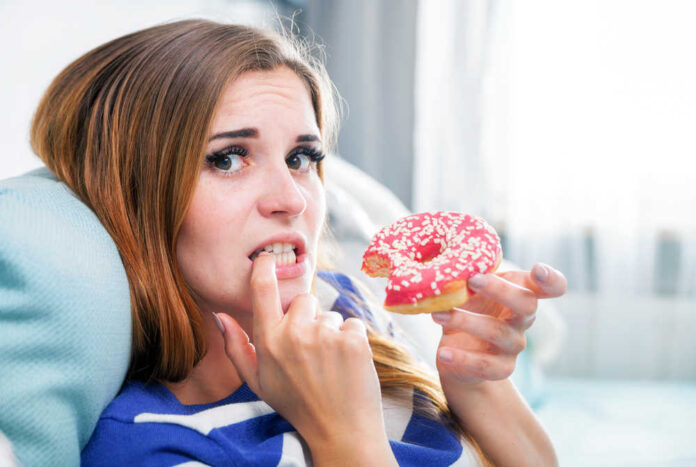
Whether or not we are aware of it, our daily meals are often entangled with our emotions. Sometimes, eating is a way to celebrate and enjoy life. Other times it can be a coping mechanism to deal with boredom, sadness, or stress.
And sometimes, eating can provoke feelings of shame and guilt.
Gaining an understanding of the emotional side of eating can be a helpful step in developing a healthier relationship with both food and your own emotions. Without this self-awareness, it can be all too easy to fall into unhealthy habits that damage your health.
The Vicious Cycle of Guilty Eating
When guilt gets tangled up with our meals, it can lead to a vicious cycle of negative thinking and unhealthy behaviors.
You eat something you deem to be unhealthy, “bad,” or too much. This leads to feelings of guilt.
Guilt tends to bring about stress. And when we’re stressed, we often turn to food for comfort.
This can create a cycle in which we use food to cope with the negative emotions that arise from our eating habits. And this, in turn, can lead to more guilt and more negative emotions.
It’s a destructive cycle that can be difficult to break out of and often leads to weight gain, poor self-esteem, and an overall unhealthy relationship with food.
Why Do You Feel Guilty After Eating?
There are many reasons why you may feel guilty after eating. Perhaps you feel like you should be eating healthier, and so any deviation from that feels like a failure. Maybe you ate something that’s “off-limits” according to your diet. Or maybe you feel like you ate too much, even though you’re not really sure what “too much” is.
It’s also possible that your guilty feelings have nothing to do with food at all. Maybe you’re struggling with some body image issues or an eating disorder. Or maybe you’re just really hard on yourself in general.
Tips For Dealing With Guilty Eating
Guilt is not just a problem after we eat—it can also be a trigger that leads to overeating. Guilt may actually be stronger before an episode of binge eating than it is afterward.
That’s why finding a healthy way to break the cycle is so important. Here are some tips to help you disentangle your negative emotions from your eating habits:
Eat mindfully. Be present with the experience of eating. Pay attention to how the meal or snack makes you feel physically and emotionally.
Ask yourself why. Why are you reaching for food? Are you actually hungry, or are you eating because you’re stressed out or bored? Is there a better way to deal with your emotions? Why do you want this food in particular? Will it lead to more guilt?
Challenge your thinking. If you feel guilty after eating, take a step back and examine your thinking. Are you too hard on yourself? Are you putting unrealistic expectations on your diet?
Talk to someone. Talking to a therapist or counselor can be very helpful if you’re struggling with negative emotions around food. They can help you understand and manage your emotions healthily.






















